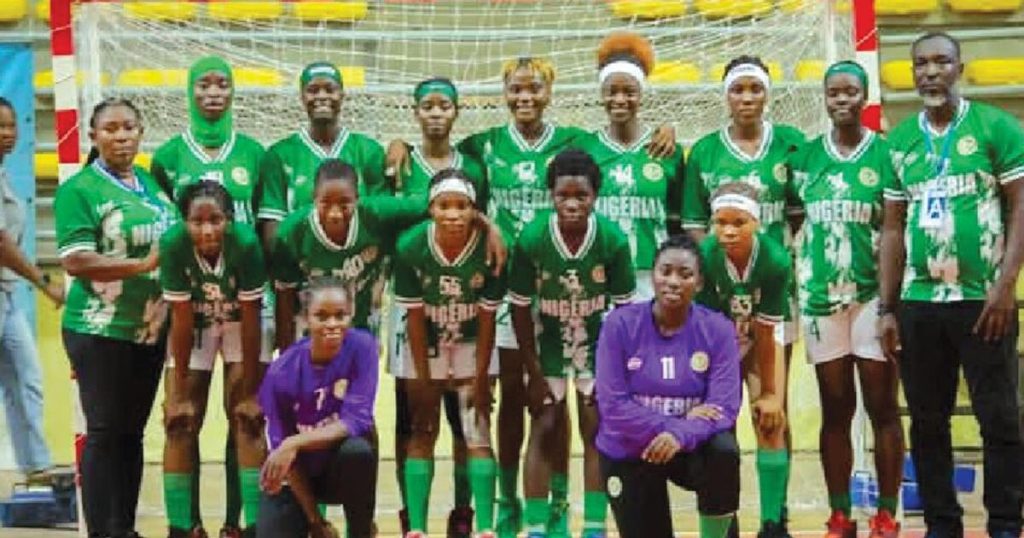Nigeria’s Financial Constraints Impact Team Size for 2025 African Women’s Youth Handball Championship
Nigeria’s preparations for the 2025 African Women’s Youth Handball Championship have been hampered by financial constraints, forcing the team to reduce its roster to the bare minimum. Initially, a pool of 30 players was invited to the first phase of training camp. This number was subsequently trimmed down to 20, and now, due to funding shortages, only 14 players will represent Nigeria in Oran, Algeria, where the tournament is scheduled to take place from September 14 to 21. This decision represents a significant setback for the team’s aspirations, as a larger squad would have provided greater tactical flexibility and player rotation options during the demanding competition. Despite these challenges, the team remains determined to build upon its recent success, having secured a bronze medal at the 2023 edition in Tunisia.
The financial limitations impacting the team’s size reflect broader challenges facing Nigerian sports development. While the Handball Federation of Nigeria President, Sam Ocheho, has been commended for his support, the lack of adequate funding restricts the team’s ability to maximize its potential. The decision to travel with only 14 players, the minimum number allowed by tournament regulations, signifies the difficult trade-offs necessitated by the funding shortfall. The ideal scenario, according to head coach John Uzor, would have been to travel with 18 players, a number that would have provided a more comfortable margin for player substitutions and injury replacements. The reduced squad size increases the pressure on each individual player and limits the coach’s strategic options during matches.
The team’s participation in the championship carries significant weight, as it serves as a qualifying tournament for both the 2026 Women’s Youth World Handball Championship and the IHF Women’s Intercontinental Phase. A strong showing in Algeria is crucial for Nigeria to secure a place in these prestigious international competitions. However, the reduced squad size presents a formidable obstacle to achieving these goals. The players will need to demonstrate exceptional resilience and teamwork to overcome the challenges posed by a smaller playing roster. The coaching staff will also need to implement innovative tactical strategies to compensate for the limited player rotation options.
Nigeria’s journey to the 2025 championship has been marked by a gradual reduction in the player pool. From the initial group of 30 invitees, ten were released after the first phase of camping. One additional player was unable to secure a passport due to financial reasons, further shrinking the squad to 19. The final selection process will eliminate five more players, leaving the team with the minimum required number of 14 for the tournament. This attrition underscores the financial pressures faced by the team and the difficult decisions that have had to be made. The players who ultimately make the final cut will carry the weight of representing their nation on their shoulders, facing formidable opponents with a smaller squad than initially anticipated.
Despite the financial constraints and the resulting reduction in squad size, the team’s morale remains high. Coach Uzor expressed his appreciation for the support provided by the federation president, emphasizing the positive efforts being made despite the challenging circumstances. This positive attitude will be crucial for the team to navigate the difficulties ahead. The players and coaching staff are focused on making the most of the available resources and demonstrating their commitment to achieving success in the championship. Their determination to overcome adversity and represent Nigeria with pride serves as a source of inspiration.
Nigeria is placed in Group A, facing strong competition from Angola, Tunisia, Kenya, Benin Republic, and Madagascar. The team’s previous bronze medal finish in the 2023 championship demonstrates their potential, and they will be aiming to replicate or even surpass that achievement in Algeria. However, the smaller squad size and the challenging group dynamics present a significant test. The players will need to perform at their peak levels, demonstrating both individual skill and cohesive teamwork to navigate the group stage and advance in the tournament. Their success will hinge on their ability to adapt to the challenges, maintain a positive mindset, and leverage the support of their dedicated coaching staff.














